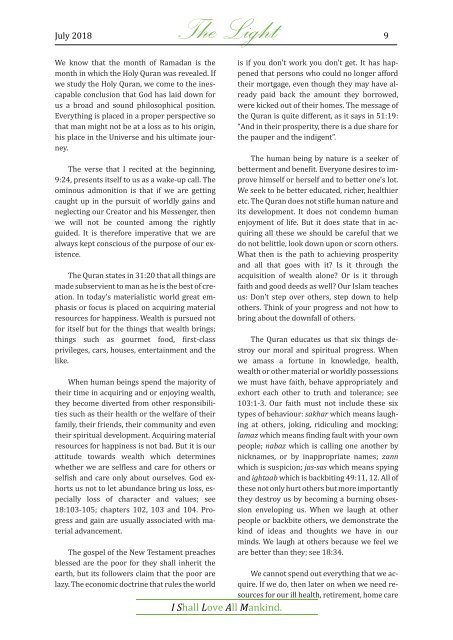The Light 2018 07 July
Organ of the Ahmadiyya Anjuman Ishaat Islam of Lahore. Preaching the Islam taught by the Holy Prophet Muhammad. Islam a religion of peace, harmony, rationality, tolerance and respect
Organ of the Ahmadiyya Anjuman Ishaat Islam of Lahore. Preaching the Islam taught by the Holy Prophet Muhammad. Islam a religion of peace, harmony, rationality, tolerance and respect
Create successful ePaper yourself
Turn your PDF publications into a flip-book with our unique Google optimized e-Paper software.
<strong>July</strong> <strong>2018</strong> <strong>The</strong><br />
<strong>Light</strong> 9<br />
We know that the month of Ramadan is the<br />
month in which the Holy Quran was revealed. If<br />
we study the Holy Quran, we come to the inescapable<br />
conclusion that God has laid down for<br />
us a broad and sound philosophical position.<br />
Everything is placed in a proper perspective so<br />
that man might not be at a loss as to his origin,<br />
his place in the Universe and his ultimate journey.<br />
<strong>The</strong> verse that I recited at the beginning,<br />
9:24, presents itself to us as a wake-up call. <strong>The</strong><br />
ominous admonition is that if we are getting<br />
caught up in the pursuit of worldly gains and<br />
neglecting our Creator and his Messenger, then<br />
we will not be counted among the rightly<br />
guided. It is therefore imperative that we are<br />
always kept conscious of the purpose of our existence.<br />
<strong>The</strong> Quran states in 31:20 that all things are<br />
made subservient to man as he is the best of creation.<br />
In today’s materialistic world great emphasis<br />
or focus is placed on acquiring material<br />
resources for happiness. Wealth is pursued not<br />
for itself but for the things that wealth brings;<br />
things such as gourmet food, first-class<br />
privileges, cars, houses, entertainment and the<br />
like.<br />
When human beings spend the majority of<br />
their time in acquiring and or enjoying wealth,<br />
they become diverted from other responsibilities<br />
such as their health or the welfare of their<br />
family, their friends, their community and even<br />
their spiritual development. Acquiring material<br />
resources for happiness is not bad. But it is our<br />
attitude towards wealth which determines<br />
whether we are selfless and care for others or<br />
selfish and care only about ourselves. God exhorts<br />
us not to let abundance bring us loss, especially<br />
loss of character and values; see<br />
18:103-105; chapters 102, 103 and 104. Progress<br />
and gain are usually associated with material<br />
advancement.<br />
<strong>The</strong> gospel of the New Testament preaches<br />
blessed are the poor for they shall inherit the<br />
earth, but its followers claim that the poor are<br />
lazy. <strong>The</strong> economic doctrine that rules the world<br />
I Shall Love All Mankind.<br />
is if you don't work you don't get. It has happened<br />
that persons who could no longer afford<br />
their mortgage, even though they may have already<br />
paid back the amount they borrowed,<br />
were kicked out of their homes. <strong>The</strong> message of<br />
the Quran is quite different, as it says in 51:19:<br />
“And in their prosperity, there is a due share for<br />
the pauper and the indigent”.<br />
<strong>The</strong> human being by nature is a seeker of<br />
betterment and benefit. Everyone desires to improve<br />
himself or herself and to better one's lot.<br />
We seek to be better educated, richer, healthier<br />
etc. <strong>The</strong> Quran does not stifle human nature and<br />
its development. It does not condemn human<br />
enjoyment of life. But it does state that in acquiring<br />
all these we should be careful that we<br />
do not belittle, look down upon or scorn others.<br />
What then is the path to achieving prosperity<br />
and all that goes with it? Is it through the<br />
acquisition of wealth alone? Or is it through<br />
faith and good deeds as well? Our Islam teaches<br />
us: Don’t step over others, step down to help<br />
others. Think of your progress and not how to<br />
bring about the downfall of others.<br />
<strong>The</strong> Quran educates us that six things destroy<br />
our moral and spiritual progress. When<br />
we amass a fortune in knowledge, health,<br />
wealth or other material or worldly possessions<br />
we must have faith, behave appropriately and<br />
exhort each other to truth and tolerance; see<br />
103:1-3. Our faith must not include these six<br />
types of behaviour: sakhar which means laughing<br />
at others, joking, ridiculing and mocking;<br />
lamaz which means finding fault with your own<br />
people; nabaz which is calling one another by<br />
nicknames, or by inappropriate names; zann<br />
which is suspicion; jas-sas which means spying<br />
and ightaab which is backbiting 49:11, 12. All of<br />
these not only hurt others but more importantly<br />
they destroy us by becoming a burning obsession<br />
enveloping us. When we laugh at other<br />
people or backbite others, we demonstrate the<br />
kind of ideas and thoughts we have in our<br />
minds. We laugh at others because we feel we<br />
are better than they; see 18:34.<br />
We cannot spend out everything that we acquire.<br />
If we do, then later on when we need resources<br />
for our ill health, retirement, home care














